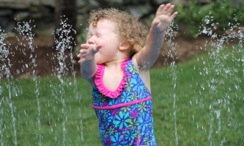
Summer is often a time for kids to have new adventures, like splashing through water or zooming down the slide at the pool. Maybe riding the roller coaster at the amusement park. Maybe heading off for the first time to summer camp. Some children rush boldly ahead. Others shrink back, watch from the sidelines, or announce that they "won't" or they "can't."
Those parents might wonder, "All these other kids are having fun. Why doesn't my child join in?" And: "Should I cheer her on? Do I push or leave her alone?"

Most parents will decide that even if a kid shuns the water slide or the roller coaster, life will nevertheless proceed normally for her. No big deal. And maybe summer camp should be postponed until next year. But when a child's excessive fearfulness persists over time, is not age-appropriate, or interferes with her daily functioning, parental concerns deepen.
As director of the Child and Adolescent Fear and Anxiety Treatment Program at the Center for Anxiety and Related Disorders at Boston University, I've met hundreds of parents with such concerns and treated hundreds of children who experience extreme stress and anxiety in their lives. I have written my new book, Growing Up Brave, for every parent who wants ideas on how to help a child navigate everyday events with greater confidence, joy, and excitement. In fact, it's in the interaction between parent and child that kids first and most powerfully learn critical lessons -- that it's safe to try new things, that frustration and fear can be overcome, that the situations that make us afraid can be mastered.
Being brave doesn't mean that a child never experiences fear. It means that she is learning to cope with a range of emotions, even the uncomfortable ones. She doesn't let the stresses of the world stop her from taking steps and participating in her life.
Over the months to come, I will be writing about some of the common anxiety-producing issues that children of different ages face. A 5-year-old has difficulty separating from mom to go on a playdate or to a birthday party. One child is terrified by lightning and thunder. One child has panic attacks in school. Another can't fall asleep at night. Another finds social encounters painful. They may confront these fears in ways that are not healthy -- by adopting avoidance behaviors, for example -- or in ways that enable them to feel better and learn to be stronger. Parents can help.
I started this entry with the water slide example because the other day I witnessed such a scene in my own backyard -- actually, in the local town pool my kids and I go to in the summer. I watched my middle child, now age 5, climb to the top of the slide -- a short one that doesn't send the rider down very fast -- hesitate as the line built up behind her, then inch back down the ladder. Finally, after several attempts, success. She emerged at the bottom with a triumphant grin. It had taken her a couple of summers to get there. My 2.5-year-old, however, took her first look at the water slide, scooted up the ladder, and rode right down. So my first suggestion is this one:
• It's good to remember that kids, even sisters, come with different temperaments. The parents I talk to in my clinical work often worry over "sibling issues." One child can handle things with no difficulty, the other can't, so what's wrong with him? But children experiment and approach the demands of life at their own pace.
• Sometimes offering a little push is not a bad idea. It's not necessary to rush an 18-month-old into swim lessons because he looks hesitant about going into the water. On the other hand, the child who rejects summer camp probably shouldn't be allowed the option of sitting home and playing games on the computer all summer. Set up an appropriate opportunity for the child to get out and interact with other kids. A little push.
• Chop up the stressful event into baby steps. There are various ways for a young child to have fun with water, for example. Instead of the water slide, maybe she can run around the sprinkler and enjoy the excitement of having water droplets on her face for the first time.
Taking baby steps -- I call them "bravery ladders" -- is a key component of the anxiety-reducing strategies I describe in Growing Up Brave. Instead of diving right into a situation that is tough for him, the child approaches it bit by bit, gaining control with each step. One success breeds another.
For more by Donna B. Pincus, Ph.D., click here.
For more on becoming fearless, click here.